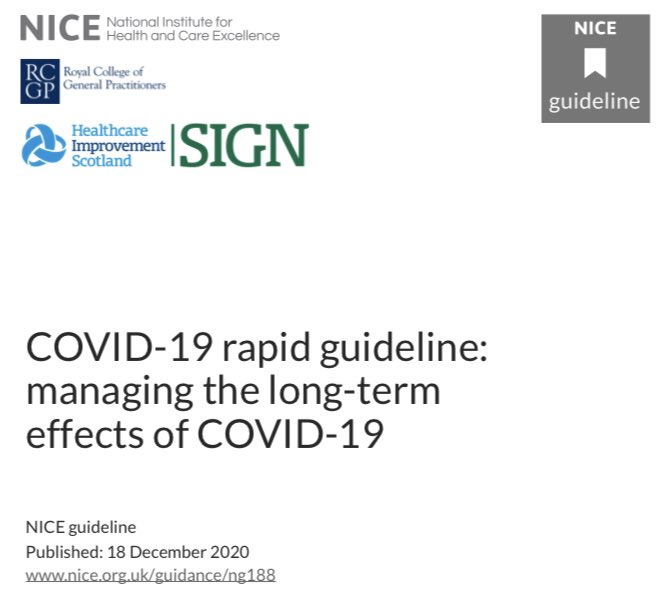Managing the long-term effects of COVID-19 @NICEComms
Important day for managing Long COVID with the publication of new NICE guidelines. Some excellent parts of the guidance and a few things that should be developed, but this feels like a good step forwards to me.
Highlights:
Important day for managing Long COVID with the publication of new NICE guidelines. Some excellent parts of the guidance and a few things that should be developed, but this feels like a good step forwards to me.
Highlights:
1) “We are using a ‘living’ approach for the guideline, which means that targeted areas will be continuously reviewed and updated in response to emerging evidence.”
Openness to reviewing and updating is incredibly important and great to see it explicitly stated.
Openness to reviewing and updating is incredibly important and great to see it explicitly stated.
2) Good attention to the needs of children:
“Consider referral from 4 weeks for specialist advice for children with ongoing symptomatic COVID-19 or post-COVID-19 syndrome.”
@long_recovery
“Consider referral from 4 weeks for specialist advice for children with ongoing symptomatic COVID-19 or post-COVID-19 syndrome.”
@long_recovery
3) Acknowledgement that a positive test is not required:
“Do not exclude people from referral to a multidisciplinary assessment service or for further investigations or specialist input based on the absence of a positive SARS-CoV-2 test (PCR, antigen or antibody).”
“Do not exclude people from referral to a multidisciplinary assessment service or for further investigations or specialist input based on the absence of a positive SARS-CoV-2 test (PCR, antigen or antibody).”
4) Awareness that those not hospitalised can be affected:
“Do not predict whether a person is likely to develop post-COVID-19 syndrome based on whether they had certain symptoms (or clusters of symptoms) or were in hospital during acute COVID-19.”
“Do not predict whether a person is likely to develop post-COVID-19 syndrome based on whether they had certain symptoms (or clusters of symptoms) or were in hospital during acute COVID-19.”
5a) Attention to ruling out pathology:
“Offer tests and investigations tailored to people's signs and symptoms to rule out acute or life-threatening complications and find out if symptoms are likely to be caused by [Long COVID- shorter] or could be a new, unrelated diagnosis.”
“Offer tests and investigations tailored to people's signs and symptoms to rule out acute or life-threatening complications and find out if symptoms are likely to be caused by [Long COVID- shorter] or could be a new, unrelated diagnosis.”
5b)
“Provide access to multidisciplinary services (these could be 'one-stop' clinics) for assessing physical and mental health symptoms and carrying out further tests and investigations. They should be led by a doctor with relevant skills and experience...”
“Provide access to multidisciplinary services (these could be 'one-stop' clinics) for assessing physical and mental health symptoms and carrying out further tests and investigations. They should be led by a doctor with relevant skills and experience...”
5c)
“Because symptoms are so wide ranging, many other areas of expertise could also be added as needed, for example rheumatology, neurology rehabilitation, cardiology, paediatrics, dietetics, speech and language therapy, nursing and pharmacy.”
“Because symptoms are so wide ranging, many other areas of expertise could also be added as needed, for example rheumatology, neurology rehabilitation, cardiology, paediatrics, dietetics, speech and language therapy, nursing and pharmacy.”
6) SNOMED codes that should help collect more data
“SNOMED CT is the standard clinical terminology for the NHS to support recording of clinical information. This supports data management and analysis to support patient care, while enabling data extraction and data exchange.”
“SNOMED CT is the standard clinical terminology for the NHS to support recording of clinical information. This supports data management and analysis to support patient care, while enabling data extraction and data exchange.”
What can be improved? Some of my colleagues have written a comment in the Lancet which sets out some areas https://marlin-prod.literatumonline.com/pb-assets/Lancet/pdfs/S0140673620327057.pdf
Thanks to @RobinGorna @Know_HG @ClaireHastie1 @DrWillN @ClareRayner6 and others
What springs out at me?
Thanks to @RobinGorna @Know_HG @ClaireHastie1 @DrWillN @ClareRayner6 and others
What springs out at me?
1) To give context to clinicians it would have been great to see reference to some of the current hypotheses around biological mechanisms. I think this helps clinicians to stay alert to complications.
Read more here:
https://www.cdc.gov/coronavirus/2019-ncov/hcp/clinical-care/late-sequelae.html
https://blogs.bmj.com/bmj/2020/12/09/confronting-the-pathophysiology-of-long-covid/
Read more here:
https://www.cdc.gov/coronavirus/2019-ncov/hcp/clinical-care/late-sequelae.html
https://blogs.bmj.com/bmj/2020/12/09/confronting-the-pathophysiology-of-long-covid/
2) I would love to see the research questions be more ambitious. This is a brand new virus. Let’s try and work out what’s causing this. Do treatments in the acute phase prevent long COVID? Are there therapeutic targets for Long COVID?
3) Let’s just call it Long COVID for now
“the term 'long COVID' is commonly used to describe signs and symptoms that continue or develop after acute COVID-19. It includes both ongoing symptomatic COVID-19 and post-COVID-19 syndrome.”
Helps to keep minds open and scientific
“the term 'long COVID' is commonly used to describe signs and symptoms that continue or develop after acute COVID-19. It includes both ongoing symptomatic COVID-19 and post-COVID-19 syndrome.”
Helps to keep minds open and scientific
These guidelines are a good start.
The next step will be making sure they are properly resourced so they work. We can’t do this cheaply. If 10% have #LongCovid at 12 weeks, and a huge number of infections have occurred, there are consequences that can’t be hidden away.
The next step will be making sure they are properly resourced so they work. We can’t do this cheaply. If 10% have #LongCovid at 12 weeks, and a huge number of infections have occurred, there are consequences that can’t be hidden away.
Here are the guidelines for your perusal https://www.nice.org.uk/guidance/ng188/resources/covid19-rapid-guideline-managing-the-longterm-effects-of-covid19-pdf-66142028400325
Thanks to everyone involved
Let’s keep looking at the positives and working together to improve things as we go on.
Thanks to everyone involved
Let’s keep looking at the positives and working together to improve things as we go on.

 Read on Twitter
Read on Twitter


